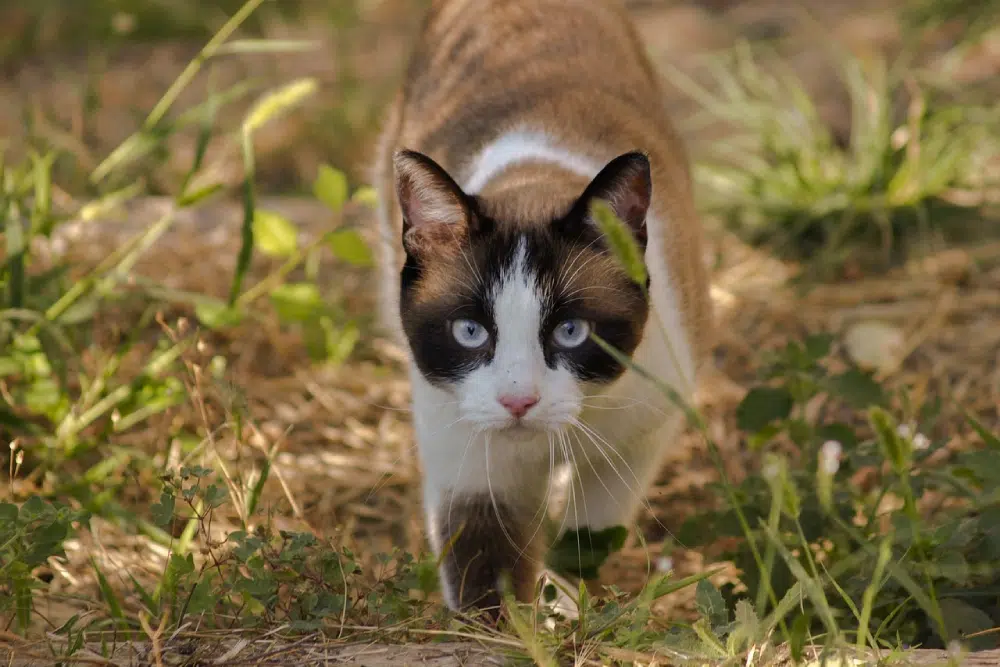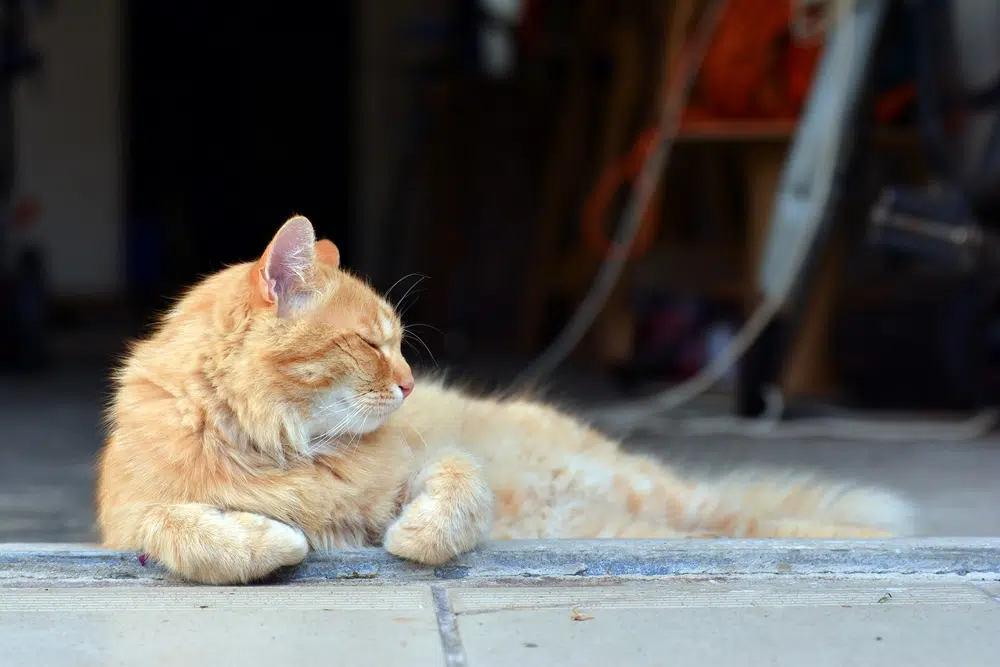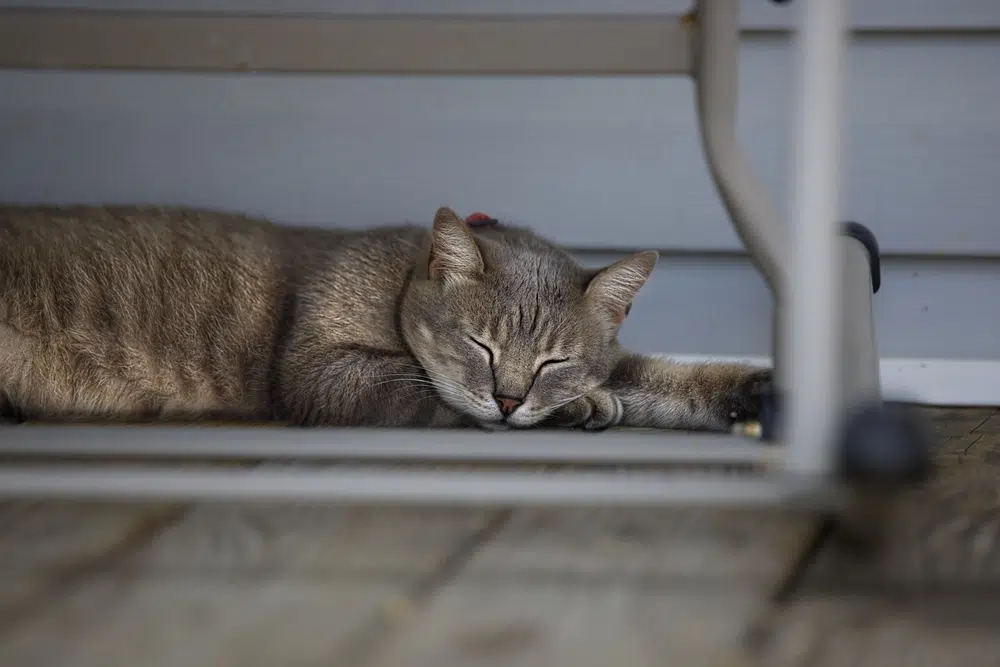Where Do Outdoor Cats Sleep? 7 Places They Like to Curl Up (Vet-Reviewed)

Some cats are strictly indoor pets and prefer lounging on a bed, tower, or sofa. However, others split their time between being inside and outside. So, when it comes to finding a safe place to sleep outdoors, where do our furry felines like to curl up?
Outdoor cats sleep anywhere that is safe and relatively quiet. Preferably, food and water are close by. There are a few places that are relatively common for outdoor cats to sleep in though. Let’s go over them just below.
The 7 Likely Places Outdoor Cats Sleep
- Open Garage
An open garage is, well, an open invitation for a place to sleep, particularly if the caregiver uses the space. The owner’s scent can calm the cat and give them a sense of security they couldn’t find elsewhere. Felines are olfactorily aware of their environment. They use several forms of nonverbal communication, including scent. Somewhere that smells like home is a haven for an outdoor animal. Plus, you can’t beat a sturdy shelter that protects you from the harsh outdoor elements. Garages also have plenty of nooks and crannies to hide and hunker down.

- Abandoned Buildings
Feral or community cats will quickly learn the activity patterns in an area. That leaves them open to choosing abandoned buildings as places to sleep. They can explore these structures at their own pace to determine if they are safe. Once familiar with a building, it’ll likely become part of the feline’s rotation of suitable shelters.
- Underneath Buildings or Porches
Small spaces underneath buildings or porches provide an ideal hidden spot to sleep and let down their guard. These areas often aren’t used much by people. Wildlife may avoid ones in inhabited places, leaving it free for an outdoor cat to use. The advantage of these types of hideouts is the shelter they provide, with walls all around and limited access in and out of the space.

- Sheltered Place in the Woods
Our feline companions are in touch with the wild side when it comes to instinctive behavior. That includes finding a place to hide wherever they are. Plenty of places exist in the woods where an outdoor cat can curl up for a nap. They can use an abandoned den, go underneath a fallen tree, or crawl inside a hollowed-out log.
- Barns
Barns are a natural choice to sleep for outdoor cats. Agriculture helped bring humans and felines together, so it’s only fitting to return to these domestication roots for shelter. The same thing that attracted cats to them in the first place is likely still present in barns, namely, rodents. That means a readily available food source in addition to a comfy place to sleep.
- Box-Like Enclosure
The ideal place is anywhere a cat can feel secure. That’s one reason these animals like boxes so much. Surprisingly, it’s just the feeling of being enclosed that does the trick. Felines will even sit in an outline of a box, presumably with the same feelings of security. Anything an outdoor cat finds that seems reasonably safe and box-like in its shape will fit the bill.
- Under Cars
Vets and animal welfare groups will tell you to watch out for cats sleeping under the hood or wheels of your car, especially in colder weather. The warmth of the car engine is attractive, but cats can be hurt when a car is started. That’s why you should scan the car and make some noise to alert any snoozing cats to move on before starting the engine.
The Risks for Outdoor Cats
We’d be remiss if we didn’t mention the risks for outdoor cats, both to the pets and wildlife. While some may think outdoor access is vital for their pets, it also increases their risk of disease, predation, and road traffic accidents. Disease is particularly worrisome because some conditions, like rabies and internal parasites, are transmissible to people.
While many associate rabies with dogs, cat cases outnumbered canine ones sixfold at 216 in 2021. An infected feline may not show signs for up to a year, making it even more dangerous. It is 100% fatal once the infection is evident. Any mammal, including people, can get the disease, with an equally grim prognosis if left untreated.
We must also consider the impacts on wildlife. According to the Centre for Integrative Ecology, School of Life and Environmental Sciences, Deakin University, cats were a factor in the extinction of 40 bird species, 21 mammals, and 2 reptile species. Another 367 combined species were threatened by feline predation. It’s a global problem, with the Polish Academy of Sciences (PASIFIC) going so far as to categorize domestic cats as an “invasive alien species.”
The issue with cats involves predation on species that haven’t had time to adapt. It’s literally a case of shooting fish in a barrel. And these animals aren’t even the most successful predators, with a kill rate of only 32%. Imagine what the estimated 2.4 billion birds killed by felines would be if that percentage was higher.
Conclusion
Outdoor cats are opportunistic regarding finding a place to sleep. They aren’t picky. However, it must be safe and give the animal a sense of security. Covered spaces with an opening to keep track of the goings-on outside are ideal for them.
Above, we identified several common spots where you might find a snoozing feline taking a much-needed cat nap, although we’re sure there are plenty of others that our outdoor felines are keeping private!


